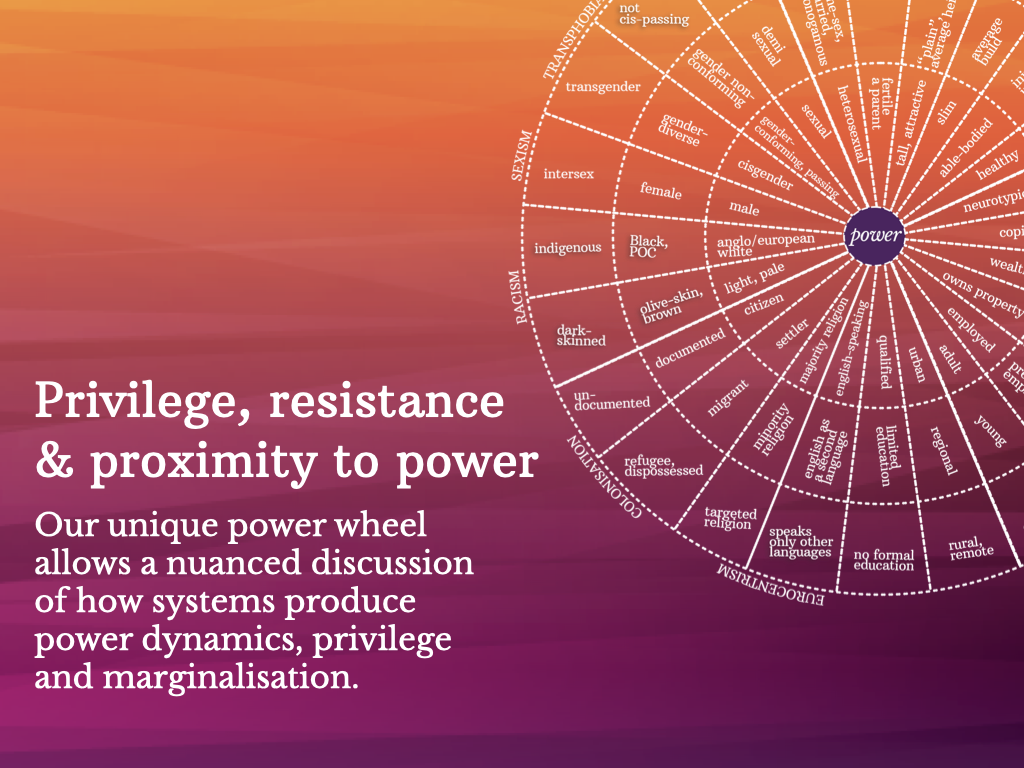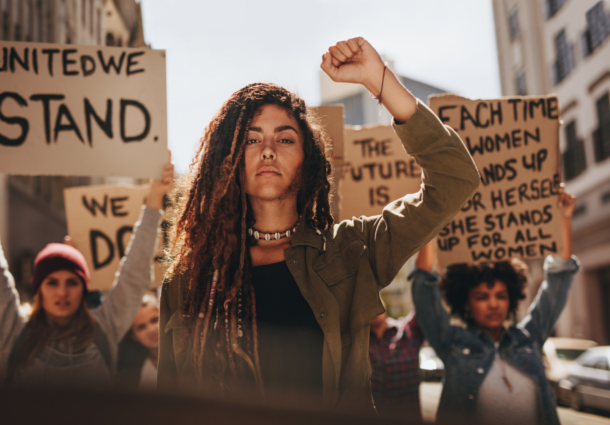privilege, marginalisation & resistance
our sexuality, gender, race or ethnicity, level of ability and more may contribute to a sense of ‘identity’ but it’s not until we encounter systems that value some attributes over others that privilege and marginalisation occur.

Although this would seem to concern individuals, the oppressions and privileges that individuals experience is structural and systemic — that is, racism, sexism, homophobia, ableism and so on are built into laws, education systems, pay scales, access to events and more. That means that any change to address oppression requires structural and systemic resistance, not individual change.
The table below is provided for accessibility, and refers to the labels on the latest version of our power wheel resource.
| Privileged (closest to power) | Discriminated against (further from power) | Marginalised/ Oppressed (furthest from power) |
| Male | Female | Intersex/ In transition |
| Cisgender | Gender-diverse | Transgender |
| Gender conforming, passing | Gender non-conforming | Not cis-passing |
| Sexual | Experiences some attraction | Asexual |
| Heterosexual | Same-sex attracted | Bisexual, queer |
| Married, long-term de facto | Serial monogamy | Polyamorous, promiscuous |
| Two-parent family, childless couple | Childless individual | Multi-generational family, single parent |
| Fertile | Fertility issues | Infertile |
| Tall, attractive | “Plain”, average height | Short-statured, has facial difference |
| Slim | Average build | Large, fat |
| Able-bodied | Injured, invisibly disabled | Visibly disabled, uses assistive tech |
| Healthy | Health issues | Chronically ill, in chronic pain |
| Neurotypical | Neurodivergent | Intellectually disabled, brain injury, complex mental health |
| Coping | Struggling | In crisis |
| Adult | Young | Elderly |
| Wealthy, very high income | Comfortable, middle income | Poor, low income/no income |
| Upper class, inherited assets | Middle class, working class | Under class |
| Owns property | Renting, sheltered | Homeless |
| Employed | Precarious employment | Unemployed |
| Urban | Regional | Rural, remote |
| Qualified, literate | Limited education | No formal education |
| English-speaking | English as a second language | Speaks only other languages |
| Majority religion, atheist | Minority religion | Targeted religion |
| Settler | Migrant | Refugee, dispossessed |
| Citizen | Documented | Undocumented |
| Light-skinned, pale | Olive-skinned, brown-skinned | Dark-skinned |
| Anglo/European | African, Asian, Middle-Eastern, Indian, Latin American | Indigenous |
For definitions of these terms, please see our Glossary.
Download this free resource for your training
This A4 PDF consists of the privilege wheel above and prompts to add the labels on the axes that create marginalisation and oppression.
Our most requested resource, the privilege wheel handout is designed for use in small group discussion as part of intersectionality training. As a guide, please consider adding a $5 donation per participant to your order if you or your organisation can afford it. We have made it possible to download the PDF for free for individual use or for First Nations organisations.
Considering in-house training?
We offer a free one-hour consultation for those looking to add intersectionality into their organisational practices. After we have determined your key areas of interest, we will discuss which of our services might be right for you, from intersectionality 101 training for your staff to organisation-wide assessment of your business goals, your policies, buildings and amenities and more.
What we do
- Tailored intersectionality training to help your organisation understand the basic elements
- CultureShift five-week program to embed practice and intersectional approaches
- Audit your organisation using an overarching intersectional lens
- Review policies and collateral
- Consult on event accessibility
- Evaluate existing intersectionality strategies and outcomes
Book a consultation

